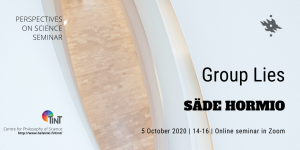
At the Perspectives on Science seminar on Monday 5.10., Säde Hormio (University of Helsinki) will give a presentation titled “Group Lies”. The seminar will be organized as an online meeting in Zoom from 2-4 pm. Zoom is an online conference tool supported by University of Helsinki.
Perspectives on Science is a weekly research seminar which brings together experts from science studies and philosophy of science. It is organized by TINT, the Centre for Philosophy of Social Science at the University of Helsinki. More information about the seminar here.
To join the seminar please contact tatu.nuotio(a)helsinki.fi or kaisla.kareoja(a)helsinki.fi. Information about using Zoom can be found here.
Author bio:
Säde Hormio is a Marie Skłodowska-Curie Fellow at Practical Philosophy in the University of Helsinki and a member of TINT. Her research focuses on shared and collective responsibility. She is also interested in questions of social epistemology, of knowledge and ignorance, and the mechanisms that can cause institutional ignorance, either deliberately or by accident. Read more at shormio.wordpress.com.
Abstract:
To tell a lie is to make a statement that you believe to be untrue, but want the addressee(s) to believe. In this paper, I will discuss what it is for groups to lie. The position of a group agent on a given issue is not necessarily shared by their individual members. Instead, a group belief, decision, position, statement etc. is often the product of a compromise to a certain degree. It is certainly a product of people acting within their roles. The decisions and course of action that members vote for might not be what they would opt for in their private lives, but is instead what they believe to be in the best interest of the group. So, while a group might believe ‘that p’, its members might not believe it.
